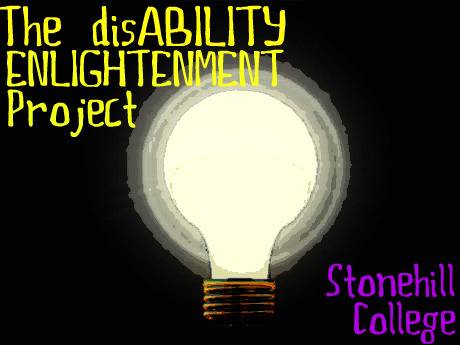
So, earlier in the semester I wrote a research design paper for my Communication Theory capstone class on Deaf culture, something that I have recently developed an interest in. So I figured I'd use some excerpts from my paper to explain it a little better.
Deaf culture is something very few people understand or really even acknowledge as a culture in and of itself. Many do not understand the difference between “Deaf” and “deaf.” According to Padden and Humphries (2005, p. 1) “Deaf” describes the cultural practices of a group within a group. Padden and Humphries explain that the larger group, “deaf” refers to the “condition of deafness, or the larger group of individuals with hearing loss without reference to this particular [Deaf] culture.” People who are “Deaf” see hearing loss as a difference rather than a disability. They also see it as a culture which could be comparable to an ethnic identity and this is because they have their own language and cultural beliefs. To persons whom identify with Deaf culture, being Deaf is no different than being African-American, Asian, or Latino. It is also important to recognize that one can be Deaf without being deaf and one can be deaf without being Deaf.
With the relationship and communication between deaf and hearing come issues of power and superiority. Harlan Lane, in his chapter “Construction of Deafness” in The Disability Studies Reader (ed. Davis, 2006, p.84) he quotes Deaf leader MJ Bienvenu as saying “How can we fight for official recognition of ASL and allow ourselves as ‘communication disordered’ at the same time? … We are proud of our language, culture and heritage. Disabled we are not!” Oftentimes language constrains D/deaf persons, automatically putting them in a position of less power. The first reason is because clearly the primary means of communication in the United States is done by speaking English. D/deaf persons who chose to communicate using ASL are already at a disadvantage because they are already in the minority. Personally, I have always had a problem with the word “disability” because the prefix “dis-” means away, not, or negative, therefore it gives the connotation of being the opposite of ability. Language oppresses disabled persons and words and phrases like “deaf,” “hearing impaired,” and “hard of hearing,” often carry a negative stigma.
Cochlear implants are a subject of debate in the D/deaf community—they are devices that are implanted surgically that enable persons who are profoundly deaf or hearing impaired to receive a sense of sound. It is important to understand that these are not amplifiers and that results do vary with these devices depending on factors such as age. These devices are a subject for debate because many members of the D/deaf community see them as a threat to Deaf culture Lane (1992, p. 216) explains that these implants are aimed to regulate and eliminate deaf culture, language, and community. Because many see Deaf culture as similar to an ethnic group and a defining factor of their identity, asking a person to consider a cochlear implant would be like asking a black person to consider changing their skin color to white. By changing a person from D/deaf to hearing, you are altering their identity and changing the way they integrate into society and how that person sees him or herself as a human being. I previously mentioned issues of power dynamics between deaf and hearing, and by implanting a cochlear implant in a person, one is assuming that hearing is better than deaf and that deafness is something that needs to be cured like a disease.
Basically in my research design paper, I wanted to learn more about this idea of Deafness and how it affects communication dynamics within the D/deaf community, particularly within families that have conflictual views on the subject. I also think that hearing people don't understand why D/deaf persons would want to continue being deaf. I believe we need to work towards a mutual understanding not only between deaf persons who identify with Deaf culture and those who don't, but also hearing and D/deaf persons.
A lot of my influence for this study was based on a documentary titled Sound and Fury by director Josh Aronson. The tagline of this documentary is “If you could make your deaf child hear, would you?” It follows a few sets of interrelated families and their struggles in decision making on the subject of cochlear implants. By watching this film I was able to learn a lot about Deaf culture—things I would not have picked up on by just reading about it.
Check Out This YouTube Clip!
I liked this film because although there is a lot of literature on deafness as a "condition," there is not a lot written about Deaf Culture. This 2000 film was definitely something that had to be created to increase understanding about the topic.
I also found it interesting how some communities are hotspots for Deaf culture, whereas other communities do not even think about increasing options for the D/deaf community. When I was in D.C., I felt like things were much more accessible for the D/deaf community. Like if I attended a government meeting, there would be ASL interpreters as well as sternographers recording everything that was spoken and projecting it up onto a big screen. Hopefully one day this will be the norm everywhere.
Anyway, that is all for today!
P.S. Everyone is almost on break! That means no excuses you guys! Contact me to write a blog post of your own


